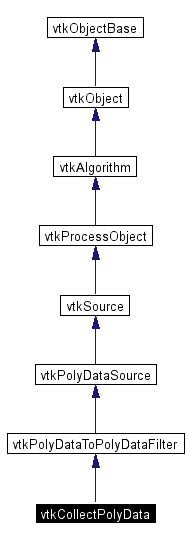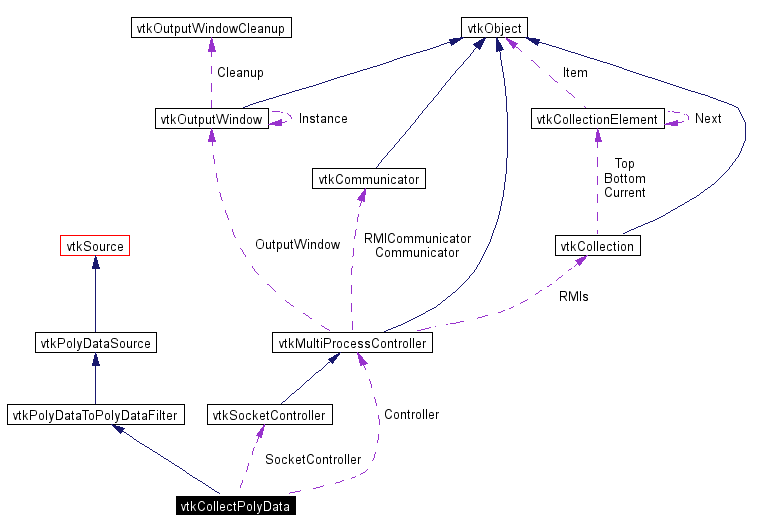vtkCollectPolyData Class Reference
#include <vtkCollectPolyData.h>
Inheritance diagram for vtkCollectPolyData:
 [legend]
[legend]Collaboration diagram for vtkCollectPolyData:
 [legend]List of all members.
[legend]List of all members.
Detailed Description
Collect distributed polydata.
This filter has code to collect polydat from across processes onto node 0. Collection can be turned on or off using the "PassThrough" flag.
- Created by:
-
- CVS contributions (if > 5%):
- Law, Charles (88%)
- Cedilnik, Andy (8%)
- CVS logs (CVSweb):
/Parallel/vtkCollectPolyData.h)/Parallel/vtkCollectPolyData.cxx)
Definition at line 41 of file vtkCollectPolyData.h.
Member Typedef Documentation
Constructor & Destructor Documentation
| vtkCollectPolyData::vtkCollectPolyData |
( |
|
) |
[protected] |
|
Member Function Documentation
|
|
Create an object with Debug turned off, modified time initialized to zero, and reference counting on.
Reimplemented from vtkAlgorithm. |
| virtual const char* vtkCollectPolyData::GetClassName |
( |
|
) |
[virtual] |
|
| int vtkCollectPolyData::IsTypeOf |
( |
const char * |
type |
) |
[static] |
|
|
|
Return 1 if this class type is the same type of (or a subclass of) the named class. Returns 0 otherwise. This method works in combination with vtkTypeRevisionMacro found in vtkSetGet.h.
Reimplemented from vtkPolyDataToPolyDataFilter. |
| virtual int vtkCollectPolyData::IsA |
( |
const char * |
type |
) |
[virtual] |
|
|
|
Return 1 if this class is the same type of (or a subclass of) the named class. Returns 0 otherwise. This method works in combination with vtkTypeRevisionMacro found in vtkSetGet.h.
Reimplemented from vtkPolyDataToPolyDataFilter. |
| void vtkCollectPolyData::PrintSelf |
( |
ostream & |
os, |
|
|
vtkIndent |
indent |
|
) |
[virtual] |
|
|
|
Methods invoked by print to print information about the object including superclasses. Typically not called by the user (use Print() instead) but used in the hierarchical print process to combine the output of several classes.
Reimplemented from vtkPolyDataToPolyDataFilter. |
|
|
By defualt this filter uses the global controller, but this method can be used to set another instead. |
|
|
By defualt this filter uses the global controller, but this method can be used to set another instead. |
|
|
When this filter is being used in client-server mode, this is the controller used to communicate between client and server. Client should not set the other controller. |
|
|
When this filter is being used in client-server mode, this is the controller used to communicate between client and server. Client should not set the other controller. |
| virtual void vtkCollectPolyData::SetPassThrough |
( |
int |
|
) |
[virtual] |
|
|
|
To collect or just copy input to output. Off (collect) by default. |
| virtual int vtkCollectPolyData::GetPassThrough |
( |
|
) |
[virtual] |
|
|
|
To collect or just copy input to output. Off (collect) by default. |
| virtual void vtkCollectPolyData::PassThroughOn |
( |
|
) |
[virtual] |
|
|
|
To collect or just copy input to output. Off (collect) by default. |
| virtual void vtkCollectPolyData::PassThroughOff |
( |
|
) |
[virtual] |
|
|
|
To collect or just copy input to output. Off (collect) by default. |
| void vtkCollectPolyData::ComputeInputUpdateExtents |
( |
vtkDataObject * |
output |
) |
[protected, virtual] |
|
|
|
What is the input update extent that is required to produce the desired output? By default, the whole input is always required but this is overridden in many subclasses.
Reimplemented from vtkPolyDataSource. |
| void vtkCollectPolyData::ExecuteData |
( |
vtkDataObject * |
|
) |
[protected, virtual] |
|
|
|
This method is the one that should be used by subclasses, right now the default implementation is to call the backwards compatibility method
Reimplemented from vtkSource. |
| void vtkCollectPolyData::ExecuteInformation |
( |
|
) |
[protected, virtual] |
|
Member Data Documentation
The documentation for this class was generated from the following file:

